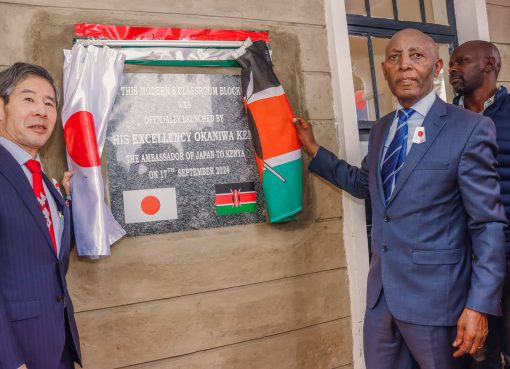The government is set to audit the validity of licenses issued to mining companies across the country as part of an initiative to enforce compliance and bring order in the lucrative multi-billion shillings’ sector.
Mining, Blue Economy and Maritime Affairs CS Salim Mvurya said no mining firm would be allowed to operate in Kenya on an expired license or without providing proper documentation recognized by law.
The CS was speaking at Kishushe Monday after a site visit at the conflict-ridden Samruddha Resources Kenya Ltd, a major iron-ore mining firm in Taita-Taveta County.
He was accompanied by senior officials including Maritime Affairs PS Shedrack Mwadime and his Mining counterpart Irungu Mwangi.
Local leaders present included Governor Andrew Mwadime, County Commissioner Loyford Kibaara, MPs Danson Mwashako (Wundanyi), Peter Shake (Mwatate) Bwire (John-Taveta), Senator John Mwaruma and Women Representative Lydia Haika.
“We will examine the licenses issued to miners to ensure that they are up to date. The era when miners were carrying out mining activities in the county without having a valid license are over,” he said.
Mvurya stated mining firms must comply with the provisions of Mining Act 2016 especially on revenue sharing.
He noted the act stipulated 70 per cent of the revenues from sales of minerals was meant for the National Government, while 20 per cent was to be given to the county government, where the mining firm was located. The local community living in the mining zone would also get ten per cent.
The CS noted the sharing of revenue from sale of minerals amongst the three parties has been affected by lack of clear-cut policies and proper legislative framework to support the disbursement of funds.
He however disclosed that he had constituted a team to fast track the revenue-sharing activities to allow for National Treasury release monies to the County government.
“I have formed a team to hasten the process of streamlining the sharing of revenue. This team will work closely with officials from the county governments to make sure royalties from mining were given to the counties,” he said.
The CS directed mining companies to adhere to conditions in Community Development Agreements (CDAs) entered into by CDA committees on behalf of the community.
He added that mining investors were by law required to give back to the community one per cent of the total revenue from sales.
He cited the case of Base Titanium in Kwale County which gave over sh 200 million to the community in 2021 as part of its Corporate Social Responsibility (CSR).
“The one per cent is not negotiable. It must be paid to the community. The government is committed to ensuring that the community gets its share of revenue from investors who are mining in their regions,” he said.
The CS also assured the residents of his commitment to resolve the revenue row between the community and officials of Samruddha Resources Kenya Ltd.
In the last five months, members of the 64,000-acre Kishushe Ranching Cooperative Society Limited where an investor in mining iron-ore have been embroiled in a dispute over the amount of money the investor was to pay to the ranch.
The chairman of the Kishushe Cooperative Society Mr. Chombo Shete accused the investor of violating the lease agreement and reneging on conditions of the CDA.
Shete said Samruddha Resources had refused to pay the agreed-upon monthly rates to the ranch members.
He further accused the investor of not drilling a borehole for the ranch as agreed in addition to failing to maintain roads and engaging in Corporate Social Responsibility (CSR) activities.
“The investor had violated all agreements we had with him. This forced us to withdraw the lease we had given him until he complies,” he said.
Shete stated they did not want to evict the investor from the land but they were only pushing him into honoring the lease agreement.
Wundanyi MP Danson Mwashako however called for transparency in the issue of revenue sharing between the investor and the ranch members.
The MP said the conflict between the two parties was a result of secrecy and the opaque manner in which the revenue was shared and utilized by the committee members.
“The investor says he has paid all the money he was supposed to pay. The only way to establish the truth is to have the ranch committee and the investor come with documents to prove their claims,” he said.
By Wagema Mwangi





